- Home
- William Shakespeare
Complete Plays, The Page 9
Complete Plays, The Read online
Page 9
And calls herself Revenge, and thinks me mad:
Hark, villains! I will grind your bones to dust
And with your blood and it I’ll make a paste,
And of the paste a coffin I will rear
And make two pasties of your shameful heads,
And bid that strumpet, your unhallow’d dam,
Like to the earth swallow her own increase.
This is the feast that I have bid her to,
And this the banquet she shall surfeit on;
For worse than Philomel you used my daughter,
And worse than Progne I will be revenged:
And now prepare your throats. Lavinia, come,
He cuts their throats
Receive the blood: and when that they are dead,
Let me go grind their bones to powder small
And with this hateful liquor temper it;
And in that paste let their vile heads be baked.
Come, come, be every one officious
To make this banquet; which I wish may prove
More stern and bloody than the Centaurs’ feast.
So, now bring them in, for I’ll play the cook,
And see them ready ’gainst their mother comes.
Exeunt, bearing the dead bodies
SCENE III. COURT OF TITUS’S HOUSE. A BANQUET SET OUT.
Enter Lucius, Marcus, and Goths, with Aaron prisoner
Lucius
Uncle Marcus, since it is my father’s mind
That I repair to Rome, I am content.
First Goth
And ours with thine, befall what fortune will.
Lucius
Good uncle, take you in this barbarous Moor,
This ravenous tiger, this accursed devil;
Let him receive no sustenance, fetter him
Till he be brought unto the empress’ face,
For testimony of her foul proceedings:
And see the ambush of our friends be strong;
I fear the emperor means no good to us.
Aaron
Some devil whisper curses in mine ear,
And prompt me, that my tongue may utter forth
The venomous malice of my swelling heart!
Lucius
Away, inhuman dog! unhallow’d slave!
Sirs, help our uncle to convey him in.
Exeunt Goths, with Aaron. Flourish within
The trumpets show the emperor is at hand.
Enter Saturninus and Tamora, with Aemilius, Tribunes, Senators, and others
Saturninus
What, hath the firmament more suns than one?
Lucius
What boots it thee to call thyself a sun?
Marcus Andronicus
Rome’s emperor, and nephew, break the parle;
These quarrels must be quietly debated.
The feast is ready, which the careful Titus
Hath ordain’d to an honourable end,
For peace, for love, for league, and good to Rome:
Please you, therefore, draw nigh, and take your places.
Saturninus
Marcus, we will.
Hautboys sound. The Company sit down at table
Enter Titus dressed like a Cook, Lavinia veiled, Young Lucius, and others. Titus places the dishes on the table
Titus Andronicus
Welcome, my gracious lord; welcome, dread queen;
Welcome, ye warlike Goths; welcome, Lucius;
And welcome, all: although the cheer be poor,
’Twill fill your stomachs; please you eat of it.
Saturninus
Why art thou thus attired, Andronicus?
Titus Andronicus
Because I would be sure to have all well,
To entertain your highness and your empress.
Tamora
We are beholding to you, good Andronicus.
Titus Andronicus
An if your highness knew my heart, you were.
My lord the emperor, resolve me this:
Was it well done of rash Virginius
To slay his daughter with his own right hand,
Because she was enforced, stain’d, and deflower’d?
Saturninus
It was, Andronicus.
Titus Andronicus
Your reason, mighty lord?
Saturninus
Because the girl should not survive her shame,
And by her presence still renew his sorrows.
Titus Andronicus
A reason mighty, strong, and effectual;
A pattern, precedent, and lively warrant,
For me, most wretched, to perform the like.
Die, die, Lavinia, and thy shame with thee;
Kills Lavinia
And, with thy shame, thy father’s sorrow die!
Saturninus
What hast thou done, unnatural and unkind?
Titus Andronicus
Kill’d her, for whom my tears have made me blind.
I am as woful as Virginius was,
And have a thousand times more cause than he
To do this outrage: and it now is done.
Saturninus
What, was she ravish’d? tell who did the deed.
Titus Andronicus
Will’t please you eat? will’t please your highness feed?
Tamora
Why hast thou slain thine only daughter thus?
Titus Andronicus
Not I; ’twas Chiron and Demetrius:
They ravish’d her, and cut away her tongue;
And they, ’twas they, that did her all this wrong.
Saturninus
Go fetch them hither to us presently.
Titus Andronicus
Why, there they are both, baked in that pie;
Whereof their mother daintily hath fed,
Eating the flesh that she herself hath bred.
’Tis true, ’tis true; witness my knife’s sharp point.
Kills Tamora
Saturninus
Die, frantic wretch, for this accursed deed!
Kills Titus
Lucius
Can the son’s eye behold his father bleed?
There’s meed for meed, death for a deadly deed!
Kills Saturninus. A great tumult. Lucius, Marcus, and others go up into the balcony
Marcus Andronicus
You sad-faced men, people and sons of Rome,
By uproar sever’d, like a flight of fowl
Scatter’d by winds and high tempestuous gusts,
O, let me teach you how to knit again
This scatter’d corn into one mutual sheaf,
These broken limbs again into one body;
Lest Rome herself be bane unto herself,
And she whom mighty kingdoms court’sy to,
Like a forlorn and desperate castaway,
Do shameful execution on herself.
But if my frosty signs and chaps of age,
Grave witnesses of true experience,
Cannot induce you to attend my words,
To Lucius
Speak, Rome’s dear friend, as erst our ancestor,
When with his solemn tongue he did discourse
To love-sick Dido’s sad attending ear
The story of that baleful burning night
When subtle Greeks surprised King Priam’s Troy,
Tell us what Sinon hath bewitch’d our ears,
Or who hath brought the fatal engine in
That gives our Troy, our Rome, the civil wound.
My heart is not compact of flint nor steel;
Nor can I utter all our bitter grief,
But floods of tears will drown my oratory,
And break my utterance, even in the time
When it should move you to attend me most,
Lending your kind commiseration.
Here is a captain, let him tell the tale;
Your hearts will throb and weep to hear him speak.
Lucius
Then, noble auditory, be it known to you,
That cursed Chiron and Demetrius
Were they that murdered our emperor’s brother;
And they it were that ravished our sister:
For their fell faults our brothers were beheaded;
Our father’s tears despised, and basely cozen’d
Of that true hand that fought Rome’s quarrel out,
And sent her enemies unto the grave.
Lastly, myself unkindly banished,
The gates shut on me, and turn’d weeping out,
To beg relief among Rome’s enemies:
Who drown’d their enmity in my true tears.
And oped their arms to embrace me as a friend.
I am the turned forth, be it known to you,
That have preserved her welfare in my blood;
And from her bosom took the enemy’s point,
Sheathing the steel in my adventurous body.
Alas, you know I am no vaunter, I;
My scars can witness, dumb although they are,
That my report is just and full of truth.
But, soft! methinks I do digress too much,
Citing my worthless praise: O, pardon me;
For when no friends are by, men praise themselves.
Marcus Andronicus
Now is my turn to speak. Behold this child:
Pointing to the Child in the arms of an Attendant
Of this was Tamora delivered;
The issue of an irreligious Moor,
Chief architect and plotter of these woes:
The villain is alive in Titus’ house,
And as he is, to witness this is true.
Now judge what cause had Titus to revenge
These wrongs, unspeakable, past patience,
Or more than any living man could bear.
Now you have heard the truth, what say you, Romans?
Have we done aught amiss,— show us wherein,
And, from the place where you behold us now,
The poor remainder of Andronici
Will, hand in hand, all headlong cast us down.
And on the ragged stones beat forth our brains,
And make a mutual closure of our house.
Speak, Romans, speak; and if you say we shall,
Lo, hand in hand, Lucius and I will fall.
Aemilius
Come, come, thou reverend man of Rome,
And bring our emperor gently in thy hand,
Lucius our emperor; for well I know
The common voice do cry it shall be so.
All
Lucius, all hail, Rome’s royal emperor!
Marcus Andronicus
Go, go into old Titus’ sorrowful house,
To Attendants
And hither hale that misbelieving Moor,
To be adjudged some direful slaughtering death,
As punishment for his most wicked life.
Exeunt Attendants
Lucius, Marcus, and the others descend
All
Lucius, all hail, Rome’s gracious governor!
Lucius
Thanks, gentle Romans: may I govern so,
To heal Rome’s harms, and wipe away her woe!
But, gentle people, give me aim awhile,
For nature puts me to a heavy task:
Stand all aloof: but, uncle, draw you near,
To shed obsequious tears upon this trunk.
O, take this warm kiss on thy pale cold lips,
Kissing Titus
These sorrowful drops upon thy blood-stain’d face,
The last true duties of thy noble son!
Marcus Andronicus
Tear for tear, and loving kiss for kiss,
Thy brother Marcus tenders on thy lips:
O were the sum of these that I should pay
Countless and infinite, yet would I pay them!
Lucius
Come hither, boy; come, come, and learn of us
To melt in showers: thy grandsire loved thee well:
Many a time he danced thee on his knee,
Sung thee asleep, his loving breast thy pillow:
Many a matter hath he told to thee,
Meet and agreeing with thine infancy;
In that respect, then, like a loving child,
Shed yet some small drops from thy tender spring,
Because kind nature doth require it so:
Friends should associate friends in grief and woe:
Bid him farewell; commit him to the grave;
Do him that kindness, and take leave of him.
Young Lucius
O grandsire, grandsire! even with all my heart
Would I were dead, so you did live again!
O Lord, I cannot speak to him for weeping;
My tears will choke me, if I ope my mouth.
Re-enter Attendants with Aaron
Aemilius
You sad Andronici, have done with woes:
Give sentence on this execrable wretch,
That hath been breeder of these dire events.
Lucius
Set him breast-deep in earth, and famish him;
There let him stand, and rave, and cry for food;
If any one relieves or pities him,
For the offence he dies. This is our doom:
Some stay to see him fasten’d in the earth.
Aaron
O, why should wrath be mute, and fury dumb?
I am no baby, I, that with base prayers
I should repent the evils I have done:
Ten thousand worse than ever yet I did
Would I perform, if I might have my will;
If one good deed in all my life I did,
I do repent it from my very soul.
Lucius
Some loving friends convey the emperor hence,
And give him burial in his father’s grave:
My father and Lavinia shall forthwith
Be closed in our household’s monument.
As for that heinous tiger, Tamora,
No funeral rite, nor man m mourning weeds,
No mournful bell shall ring her burial;
But throw her forth to beasts and birds of prey:
Her life was beast-like, and devoid of pity;
And, being so, shall have like want of pity.
See justice done on Aaron, that damn’d Moor,
By whom our heavy haps had their beginning:
Then, afterwards, to order well the state,
That like events may ne’er it ruinate.
Exeunt
Romeo and Juliet
TABLE OF CONTENTS
CHARACTERS OF THE PLAY
ACT I
PROLOGUE
SCENE I. VERONA. A PUBLIC PLACE.
SCENE II. A STREET.
SCENE III. A ROOM IN CAPULET’S HOUSE.
SCENE IV. A STREET.
SCENE V. A HALL IN CAPULET’S HOUSE.
ACT II
PROLOGUE
SCENE I. A LANE BY THE WALL OF CAPULET’S ORCHARD.
SCENE II. CAPULET’S ORCHARD.
SCENE III. FRIAR LAURENCE’S CELL.
SCENE IV. A STREET.
SCENE V. CAPULET’S ORCHARD.
SCENE VI. FRIAR LAURENCE’S CELL.
ACT III
SCENE I. A PUBLIC PLACE.
SCENE II. CAPULET’S ORCHARD.
SCENE III. FRIAR LAURENCE’S CELL.
SCENE IV. A ROOM IN CAPULET’S HOUSE.
SCENE V. CAPULET’S ORCHARD.
ACT IV
SCENE I. FRIAR LAURENCE’S CELL.
SCENE II. HALL IN CAPULET’S HOUSE.
SCENE III. JULIET’S CHAMBER.
SCENE IV. HALL IN CAPULET’S HOUSE.
SCENE V. JULIET’S CHAMBER.
ACT V
SCENE I. MANTUA. A STREET.
SCENE II. FRIAR LAURENCE’S CELL.
SCENE III. A CHURCHYARD; IN IT A TOMB BELONGING TO THE CAPULETS.
CHARACTERS OF THE PLAY
Chorus.
Escalus, Prince of Verona.
Paris, a young Count, kinsman to the Prince.
Montague, heads of two houses at variance with each other.
Capulet, heads of two houses at variance with each other.
An old Man, of the Capulet family.
Romeo, son to Montague.
Tybalt, nephew to Lady Capulet.
Mercutio, kinsman to the Prince and friend to Romeo.
Benvolio, nephew to Montague, and friend to Romeo
Tybalt, nephew to Lady Capulet.
Friar Laurence, Franciscan.
Friar John, Franciscan.
Balthasar, servant to Romeo.
Abram, servant to Montague.
Sampson, servant to Capulet.
Gregory, servant to Capulet.
Peter, servant to Juliet's nurse.
An Apothecary.
Three Musicians.
An Officer.
Lady Montague, wife to Montague.
Lady Capulet, wife to Capulet.
Juliet, daughter to Capulet.
Nurse to Juliet.
Citizens of Verona; Gentlemen and Gentlewomen of both houses; Maskers, Torchbearers, Pages, Guards, Watchmen, Servants, and Attendants.
Scene: Verona; Mantua.
ACT I
PROLOGUE
Two households, both alike in dignity,
In fair Verona, where we lay our scene,
From ancient grudge break to new mutiny,
Where civil blood makes civil hands unclean.
From forth the fatal loins of these two foes
A pair of star-cross’d lovers take their life;
Whole misadventured piteous overthrows
Do with their death bury their parents’ strife.
The fearful passage of their death-mark’d love,
And the continuance of their parents’ rage,
Which, but their children’s end, nought could remove,
Is now the two hours’ traffic of our stage;
The which if you with patient ears attend,
What here shall miss, our toil shall strive to mend.
SCENE I. VERONA. A PUBLIC PLACE.
Enter Sampson and Gregory, of the house of Capulet, armed with swords and bucklers
Sampson
Gregory, o’ my word, we’ll not carry coals.
Gregory
No, for then we should be colliers.
Sampson
I mean, an we be in choler, we’ll draw.
Gregory
Ay, while you live, draw your neck out o’ the collar.
Sampson
I strike quickly, being moved.
Gregory
But thou art not quickly moved to strike.
Sampson
A dog of the house of Montague moves me.
Gregory
To move is to stir; and to be valiant is to stand: therefore, if thou art moved, thou runn’st away.

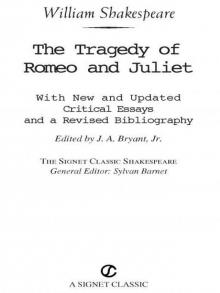 Romeo and Juliet
Romeo and Juliet As You Like It (Folger Shakespeare Library)
As You Like It (Folger Shakespeare Library)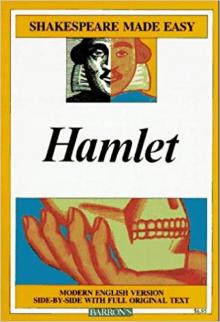 Hamlet
Hamlet Richard II (Folger Shakespeare Library)
Richard II (Folger Shakespeare Library) Macbeth
Macbeth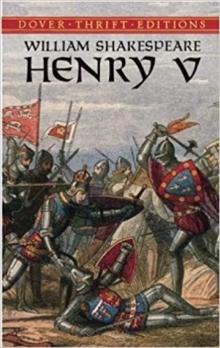 Henry V
Henry V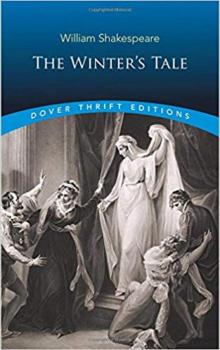 The Winter's Tale
The Winter's Tale The Taming of the Shrew
The Taming of the Shrew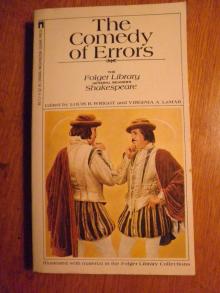 The Comedy of Errors
The Comedy of Errors King Lear (Folger Shakespeare Library)
King Lear (Folger Shakespeare Library)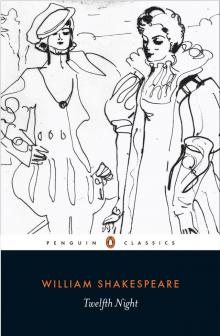 Twelfth Night
Twelfth Night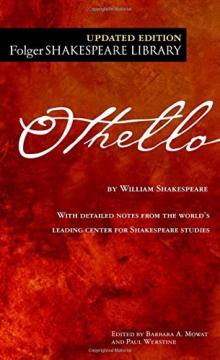 Othello
Othello The Two Gentlemen of Verona
The Two Gentlemen of Verona Henry IV, Part 1 (Folger Shakespeare Library)
Henry IV, Part 1 (Folger Shakespeare Library) King John/Henry VIII (Signet Classics)
King John/Henry VIII (Signet Classics)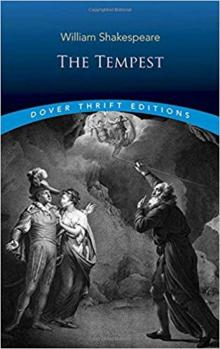 The Tempest
The Tempest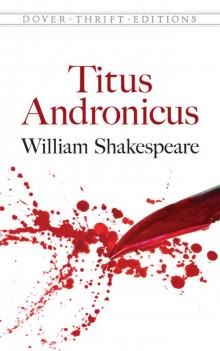 Titus Andronicus (Dover Publications)
Titus Andronicus (Dover Publications)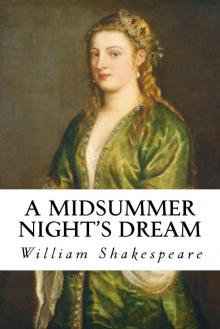 A Midsummer Night's Dream
A Midsummer Night's Dream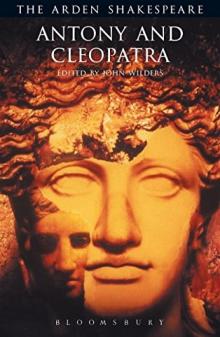 Antony and Cleopatra (Arden Shakespeare: Third Series)
Antony and Cleopatra (Arden Shakespeare: Third Series)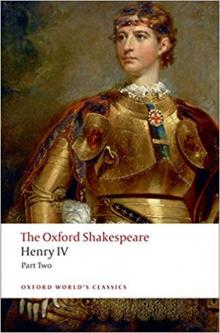 The Oxford Shakespeare: Henry IV, Part 2 (Oxford World's Classics)
The Oxford Shakespeare: Henry IV, Part 2 (Oxford World's Classics)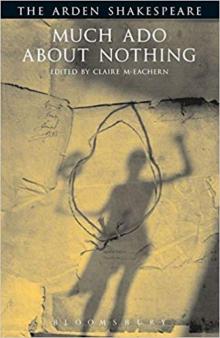 Much Ado About Nothing (Arden Shakespeare: Third Series)
Much Ado About Nothing (Arden Shakespeare: Third Series) All's Well That Ends Well
All's Well That Ends Well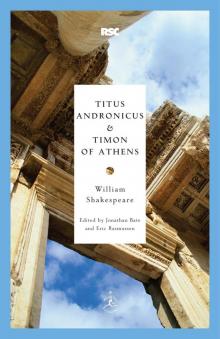 Titus Andronicus & Timon of Athens
Titus Andronicus & Timon of Athens Richard III (Modern Library Classics)
Richard III (Modern Library Classics) Coriolanus
Coriolanus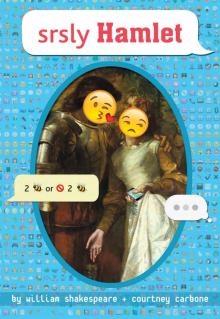 srsly Hamlet (OMG Shakespeare)
srsly Hamlet (OMG Shakespeare)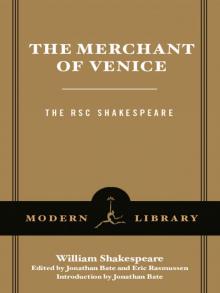 The Merchant of Venice
The Merchant of Venice Richard III
Richard III Richard II
Richard II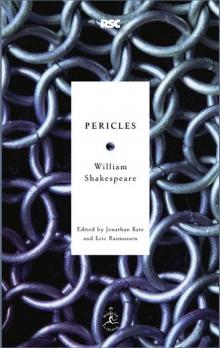 Pericles
Pericles As You Like It
As You Like It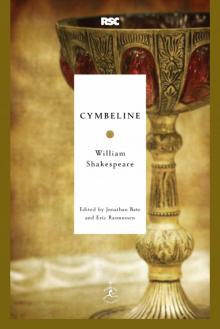 Cymbeline
Cymbeline Alls Wel that ends Well
Alls Wel that ends Well YOLO Juliet
YOLO Juliet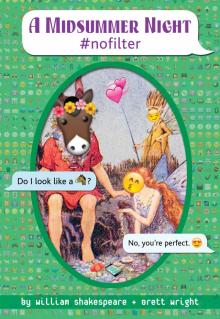 A Midsummer Night #nofilter
A Midsummer Night #nofilter Love's Labour's Lost
Love's Labour's Lost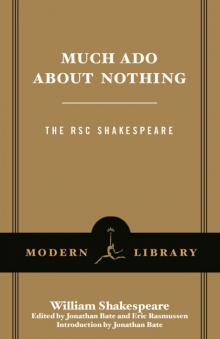 Much Ado About Nothing
Much Ado About Nothing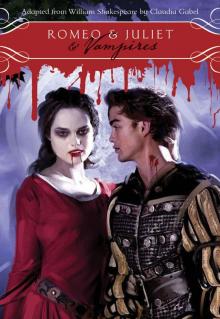 Romeo & Juliet & Vampires
Romeo & Juliet & Vampires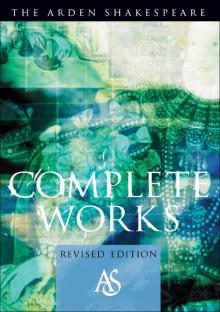 The Arden Shakespeare Complete Works
The Arden Shakespeare Complete Works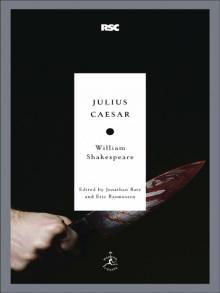 Julius Caesar
Julius Caesar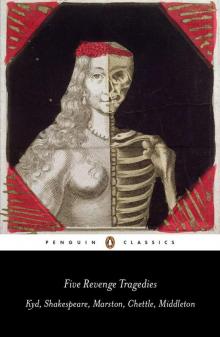 Five Revenge Tragedies: The Spanish Tragedy, Hamlet, Antonio's Revenge, The Tragedy of Hoffman, The Revenger's Tragedy (Penguin Classics)
Five Revenge Tragedies: The Spanish Tragedy, Hamlet, Antonio's Revenge, The Tragedy of Hoffman, The Revenger's Tragedy (Penguin Classics)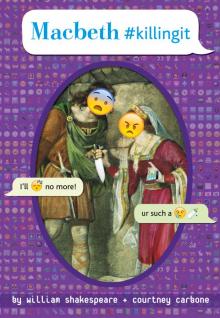 Macbeth #killingit
Macbeth #killingit The Oxford Shakespeare: The Complete Works
The Oxford Shakespeare: The Complete Works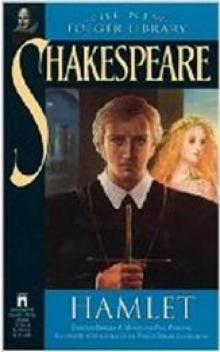 Hamlet, Prince of Denmark (Collins edition)
Hamlet, Prince of Denmark (Collins edition) King John & Henry VIII
King John & Henry VIII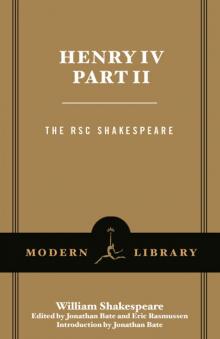 Henry IV, Part 2
Henry IV, Part 2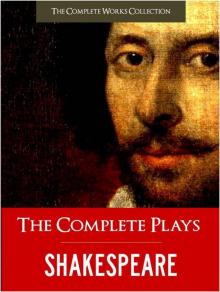 Complete Plays, The
Complete Plays, The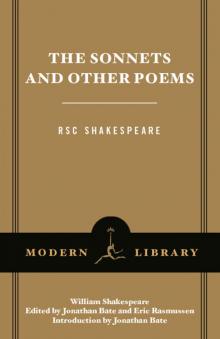 The Sonnets and Other Poems
The Sonnets and Other Poems Antony and Cleopatra
Antony and Cleopatra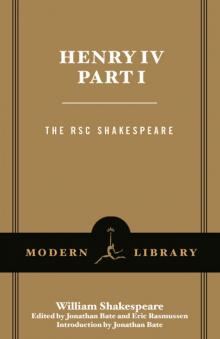 Henry IV, Part 1
Henry IV, Part 1 Is This a Dagger Which I See Before Me?
Is This a Dagger Which I See Before Me? The Complete Works of William Shakespeare In Plain and Simple English (Translated)
The Complete Works of William Shakespeare In Plain and Simple English (Translated) The Sonnets
The Sonnets